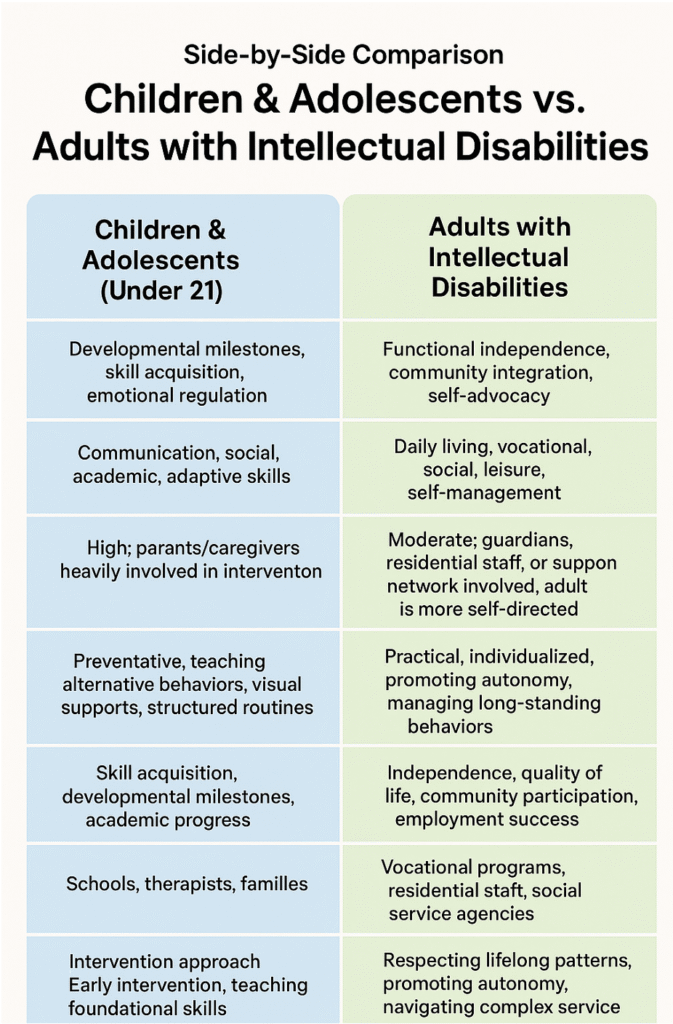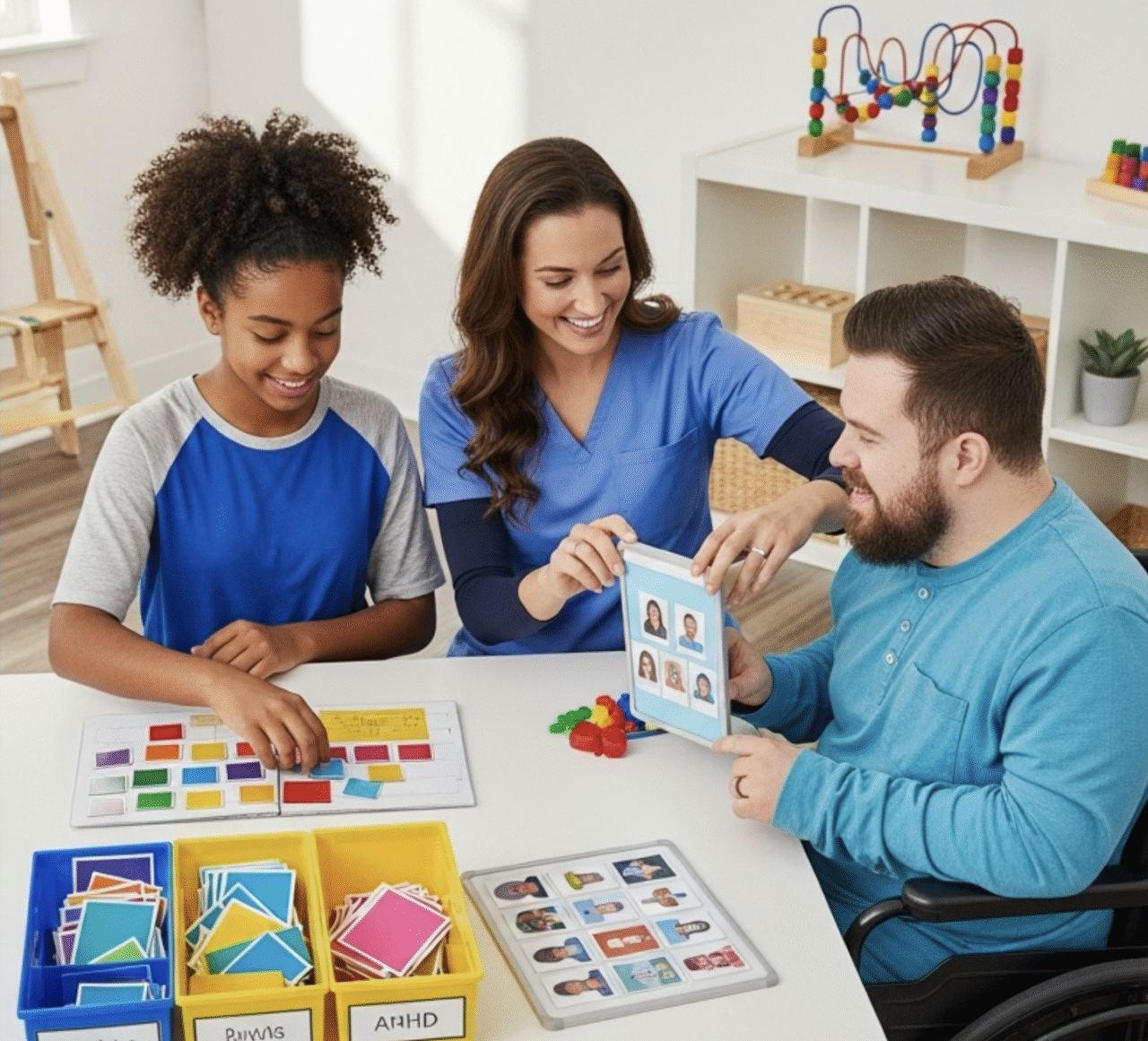Understanding The Differences: Kids vs. Adults as a BSC
Compassion, flexibility and innovation are just a few qualities that describe a Behavioral Specialist Consultant (BSC) working with individuals with disabilities. My name is Trish Trincia-Fitzgerald, and I am a Board-Certified Behavior Analyst (BCBA). Working as a Behavioral Support Consultant (BSC) is both rewarding and challenging, but above all, it is impactful. Whether supporting a child under 21 or an adult with intellectual disabilities (ID), the role of a BSC is central to helping individuals build skills, manage behaviors, and improve their overall quality of life.
I began my career in 2003 as a Therapeutic Support Staff (TSS) at Holcomb Behavioral Health, working with individuals under 21. This was my first introduction to the autism population, and I quickly fell in love with the uniqueness of each individual. While they may share a diagnosis, I learned early on that every client is different, and the same intervention does not work for everyone. My time on the front line as a TSS was invaluable—it gave me insight into the challenges staff face across different environments and showed me the importance of matching staff with clients and building strong rapport from the start.
In 2006, after earning my Master’s Degree, I began working as a Behavioral Specialist for the Chester County Intermediate Unit. I immediately appreciated the flexibility of creating my own schedule and the variety that came with each day. Working with multiple clients throughout the week kept the role engaging and dynamic. I was fortunate not only to serve wonderful clients but also to partner with inspiring and dedicated parents.
However, as my clients grew older and “aged out,” I realized I had little understanding of what came next for them. I didn’t fully know what the adult service system looked like or how best to prepare my younger clients for that transition. To gain that perspective, I began working with Home Community-Based Services (HCBS) Provider to learn about the adult system and see how services differ from those provided to children and adolescents. What I quickly discovered is that the under-21 world is vastly different from the adult world.
1. Developmental Focus vs. Functional Independence
Children and Adolescents (Under 21):
When working with younger individuals, the focus often revolves around developmental milestones and early skill-building. This includes:
- Teaching communication, social, and adaptive skills.
- Supporting academic and school-related goals.
- Collaborating closely with families, schools, and other caregivers.
The goal is often skill acquisition to support growth into adolescence and adulthood. Progress is measured in developmental benchmarks as much as behavioral outcomes.
Adults with Intellectual Disabilities: With adults, the emphasis shifts toward functional independence and community integration. BSCs support adults in:
- Employment or vocational skills.
- Managing daily living tasks such as cooking, cleaning, and budgeting.
- Social engagement in community and leisure activities.
Here, the goal is to maintain and enhance independence, rather than building foundational skills from scratch.
2. Role of Family and Caregivers
Children and Adolescents: Families are often deeply involved. A BSC might spend a significant amount of time:
- Coaching parents on strategies to reduce challenging behaviors.
- Collaborating with schools to implement behavior support plans.
- Helping caregivers navigate developmental and behavioral interventions.
Adults: While family involvement can still be important, adults are typically more self-directed. Support often extends to guardians or residential staff rather than parents, and interventions are frequently tailored to personal goals rather than family-driven priorities.
3. Behavior Support Strategies
Children and Adolescents: Behavioral strategies often focus on prevention and teaching alternative behaviors. For example:
- Reinforcing social skills in the classroom.
- Supporting emotional regulation in daily routines.
- Using structured teaching and visual supports.
Early intervention is key, and behaviors are often linked to communication deficits, developmental stages, or environmental factors.
Adults: Behavioral interventions may be more practical and individualized:
- Managing behaviors in community settings like work or day programs.
- Supporting self-advocacy and decision-making.
- Addressing long-standing behavioral patterns with data-driven interventions.
Adults often benefit from strategies that respect autonomy and choice, even while addressing challenging behaviors.
4. Goals and Outcome Measures
Children: Progress is typically measured through skill acquisition, developmental milestones, and academic success. Gains can be observed in communication, socialization, and adaptive skills.
Adults: Success is often seen in independence, quality of life, and community participation. Outcomes may include living more autonomously, holding a job, or engaging socially in meaningful ways.
5. Emotional and Professional Considerations
- Children: Working with young individuals requires patience, creativity, and the ability to navigate family dynamics. Celebrating small successes is crucial.
- Adults: Supporting adults often involves respecting lifelong patterns, navigating complex service systems, and fostering autonomy while still providing necessary guidance.
While the foundational skills of a Behavioral Specialist Consultant—assessment, data collection, and individualized intervention planning—remain constant, the focus, strategies, and collaborative relationships differ significantly between working with children under 21 and adults with intellectual disabilities. Recognizing these differences ensures that BSCs can provide effective, compassionate, and tailored support, empowering each individual to reach their fullest potential.


